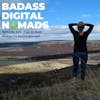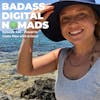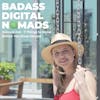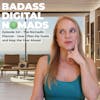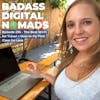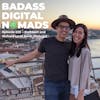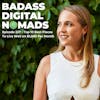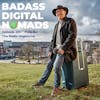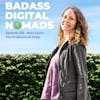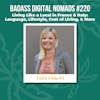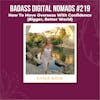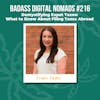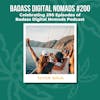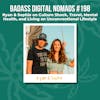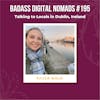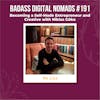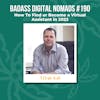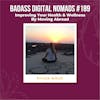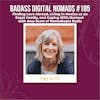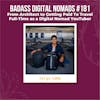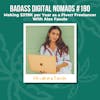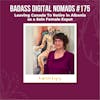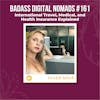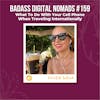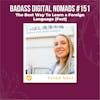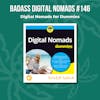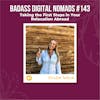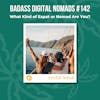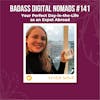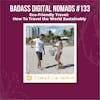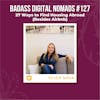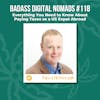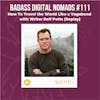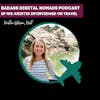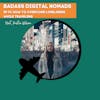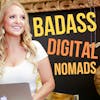How to Build a Writing Career While Traveling the World With Anthony Moore
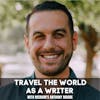
Have you ever been stuck in a job you hate? Anthony Moore can relate. Before he found success as a Top 100 Writer on Medium and the author of multiple books, he struggled with depression, addiction, and how to leave his dead-end job at a call center. Find out how he turned things around and moved abroad to South Korea with his wife before becoming a writer.
Have you ever been stuck in a job you hate? Anthony Moore can relate. Before he found success as a Top 100 Writer on Medium and the author of multiple books, he struggled with depression, addiction, and how to leave his dead-end job at a call center. After burning out, he and his wife quit their jobs to pursue their dream of living abroad in South Korea, where they remained while working full-time on their side hustles and saving money to travel throughout Southeast Asia.
In this podcast, learn how Anthony turned his life around to create the six-figure online business he runs today and how he's managed to generate more money and freedom while working less.
TOPICS DISCUSSED: BUILDING A WRITING CAREER WHILE TRAVELING THE WORLD
- How to start blogging with no prior writing experience
- How to motivate yourself to write consistently
- How to avoid the biggest mistake new writers and bloggers make
- How to build a writing business: The five main ways Anthony makes money online with writing
- Exponential Growth: Going from making $10 per year off writing to six-figures per year
- How to grow your email list to 75,000 subscribers
- How to get into top publications on Medium
- How to get featured in mainstream media outlets
- How to find time for your side hustle while working a job you hate
- Stop living a life of mediocrity: How to turn your life from ordinary to extraordinary
- Living in South Korea: Expat lifestyle and cost-of-living
- Secret travel destinations to visit in South Korea
- Self-publishing versus traditional publishing
- The best books and biographies to inspire you
- How to stop pitching to work with people and have them pursue you instead
SHOW NOTES & RESOURCES
- Book: What Extraordinary People Know
- Book: Wealthy Writers: How to Go Viral, Get Followers, and Get Rich Writing
- Book: Shoe Dog by Phil Knight
- Book: Dot Com Secrets by Russell Brunson
- Freelance Writer Starter Package
CONNECT WITH ANTHONY
Show Notes on TravelingwithKristin.com: https://www.travelingwithkristin.com/digital-nomad-podcast/medium-writer-anthony-moore
........................................................................................................
WORK WITH KRISTIN
- Book a private consultation
- Join the Make Money Mentorship 6-week program (Special offer for podcast listeners $100 off)
- Relocate abroad with Orbis Relocation or Poker Refugees
Support the Badass Digital Nomads Podcast:
- Become a Patron
- Leave a 5-Star Review
- Leave a voice message
- Submit a question or recommend a guest (feedback survey)
- Buy new Badass Digital Nomads Merch (Teespring.com/Stores/TravelingwithKristin)
Connect With Kristin on Socials:
-
- Follow on Instagram
- Subscribe to Traveling with Kristin on YouTube
- Subscribe to Digital Nomad TV on YouTube
- Join the Badass Digital Nomads Facebook Group
Podcast descriptions may contain affiliate links of products and services we use and recommend at no additional cost to you.
Sneak Peek:
Kristin: 00:00:00 It's like so cliche, but then it becomes about the process. And there's that concept of thinking back to who you were a year ago. Ben Hardy talks about this a lot for Medium. He says, if you're not embarrassed by who you were a year ago, then you're not working hard enough. And not in like a hustle culture type of way, but just in a personal growth type of way. And when you do put yourself in uncomfortable, strenuous, challenging situations, and you make it through, you know, you persevere, you just feel better about yourself than if you wouldn't have tried it.
Introduction: Welcome to Badass Digital Nomads, where we're pushing the boundaries of remote work and travel, all while staying grounded with a little bit of old school philosophy, self-development, and business advice from our guests.
Kristin: 00:00:57 Hi everyone. Kristin from Traveling with Kristin here. And welcome to episode 75 of Badass Digital Nomads. We have an interview for you today with Anthony Moore, one of the top 100 writers on Medium, and author of the books, Wealthy Writers and What Extraordinary People Know: How to Cut the Busy BS and Live Your Kick Ass Life. Anthony and his wife are also new parents and former expats who lived in South Korea as well as digital nomads who've traveled throughout Southeast Asia and beyond. But before Anthony found success as a self-employed digital nomad, he struggled with depression, addiction and how to leave his dead end job at a call center. In today's interview, we talk about how he turned things around to create the six figure online business he runs today, and how he's managed to achieve his long-term goals of having more money and freedom while working less the dream.
Kristin: 00:02:02 But first thank you to Ava from the United Kingdom who left a review in Apple Podcasts this week. She says, informative, helpful, and sincere guide driven by pure will to help us get what we all want. Financial freedom and a location independent lifestyle. Calming and sweet voice keeps you listening for hours. And Kristin's personal stories make it easy to relate to your own life experiences. The podcast is full of useful tips regarding many topics related to not just travel, but personal growth in general. Nothing left behind here. All is shared from the expert in this field. Thank you, Ava. I'm so glad you're liking my stories and the content. And also a giant welcome to my newest Patreon patron Timothy, who's a former combat veteran who has a dream of moving to Lisbon, Portugal. Welcome Tim. And to support the podcast while getting exclusive content and live streams, you can become a patron today for just $5 per month over at patreon.com/TravelingwithKristin and now onto the show. Enjoy.
Podcast Interview:
Kristin: So Anthony, welcome to the show.
Anthony: 00:03:20 Great to be here.
Kristin: 00:03:21 And where are you right now? Give us a little insight to your quarantine status. We are in September of 2020 for people listening from the future and in month, who even knows of, I think month six of the pandemic. I lost count.
Anthony: 00:03:38 Yeah, Sounds about right. <laugh>,
Kristin: 00:03:40 You were telling me, you were telling me before the call started that you have a new baby. So yeah, let's hear your, your status over there. Yeah, where are you?
Anthony: 00:03:48 I had a baby during Covid, which is pretty crazy. Um, you know, only one person loud in the hospital at a time. Like one guest once you were in, you couldn't go out. It was pretty hectic, but worked out. Baby's great. Uh, very loud, but she's good. Uh, I had a big upgrade in my quarantine status. Uh, my wife and I were living in a small, very small apartment in Los Angeles for a ton of money. Just stupid how those things coincide. Very expensive, very small. I would always bump my shoulder into the wall, like everywhere. I would just walk in this little apartment. Um, and so once we had a kid, we're like, Hey, we, we can barely stay here. We can't even, you know, bring a kid into this. So we just moved to San Diego, California. We're currently house sitting her grandparents, like literal mansion here in La Jolla, California.
Anthony: 00:04:33 Like I can see the beach, like the, like the water right there. Uh, millionaire mansions all over the place. Like I like can't even fathom how they afforded that kind of mansion. And we're living here, so we're like going around the block and it's like, I don't belong here, <laugh>.
Kristin: Oh my gosh.
Anthony: So it's just like here for a few months to just, uh, really nice, have like a pun of space. We have like a guest room. The dog has a backyard now. So quite the upgrade from like the 700 square foot cramped basement in, in Los Angeles.
Kristin: 00:04:58 Yeah, definitely. And have you been working full-time or have you taken any time off?
Anthony: 00:05:05 Yeah, so I am a full-time writer, but I work myself. You know, I do lots of, uh, income streams, freelance, my book sales online courses, um, et cetera. When I had my kid, I took off several weeks 'cause I was, I mean, gosh, anyone who has a kid just knows how exhausting that is. Um, it's been three months. I'm pretty much back in the full swing of things now. Um, but I have colleagues who have had kids who have like taken two months off like a long time. I can definitely see why. But yes, I'm back into it. Um, my wife watches a baby and I'm kind of always on call if I'm like writing, it's like, change your diaper or she's screaming or she's hungry. So I kind of gotta hop in and out, but am working full time as much as possible.
Kristin: 00:05:43 Yeah, you know, we talk a lot on this show and just in general, people talk a lot on the internet about how exotic it is to be a digital nomad as far as all of the different countries you can go to and where you can travel while you're working remotely. But I always say that the most underrated part about working from home or working remotely is that you can choose to do things like this. You can house sit for family members. I just got back from two weeks house sitting for my parents in St. Augustine while they were in Montana and walking on the beach every day with the dog walking like five miles a day on the beach. And I'll go to San Diego, stay with my brother for a month, hang out with my five-year-old niece. Just having that quality time where, you know, you might not be living in your shoebox apartment in New York or San Francisco or LA or like some of my friends who literally rent closets in places like New York, Toronto, Vancouver. But you can just live in a nicer house or you know, maybe stay in your country. Just go to a different part of the country that has more room and, and have that that experience. So that's really great that you're able to do that. Um, and spend more quality time at home with your new baby because we don't get paternity leave or maternity leave <laugh> in the United States.
Anthony: 00:07:03 Right? Oh my gosh. Healthcare out of pocket, no paternity leave. Yeah, it's, uh, expensive being watching over sometimes <laugh>.
Kristin: 00:07:10 So I know that most podcasts start with like, give us a little bit of your background story, the general info, but I feel like we're gonna cover a lot of that in the questions that I have for you today. So I wanna use something different today and start with a quote from an article that you wrote, which is related to your background and just go from there. So sounds great. We'll link to whatever this article was in the show notes when I find it again. But you say that traveling the world was always a priority for your wife and you, that you wanted to eat sushi in Japan, eat baguettes in France, eat pizza in Italy, but neither of you had really traveled anywhere. So you had been dreaming about traveling the world since you started dating, but then you got caught up in the normal, let's say this standard American lifestyle.
Kristin: 00:08:06 Fast forward through this article, and I'm gonna go to this quote where you said that although you were talking to your coworkers and telling them that you wanted to travel the world, you wanted to work from yourself for yourself, you said that they quote straight up laughed at you, they told you to keep dreaming and then you were like, fuck this, I'm gonna be,
Anthony: That was a key for me. Yeah, yeah.
Kristin: You're like, I'm gonna be a writer. I'm never working in a terrible place like this again. And you said, I knew it was time to get the hell out of my nine to five job every day when I walked into work, it felt like I was carrying a big gross, slimy acidy black ball of dread lodged firmly in my stomach then spoiler alert, you ended up in South Korea. So take us back to this job that you were working in. What was this job that filled you with slimy black balls of dread <laugh> and, you know, what was your impetus behind working for yourself and traveling?
Anthony: 00:09:15 I worked at an online for-Profit University, which is, uh, pretty controversial and has been in the news rightly so for many years.
Kristin: 00:09:25 Last week, tonight.
Anthony: 00:09:25 for shady tactics. Yeah, exactly.
Kristin: John Oliver.
Anthony: John Oliver mentioned. Yeah, my, my whole university. Um, yeah, we weren't one of the highlights, uh, I worked for Ashford University, but he, like, we were like a small segment there were, there were people worse than us. And I, I think the reason why I was able to stay there was like, I was like, well, we're one of the good ones, but really, uh, you know, I was doing essentially telemarketing for them. That's, that's really what it was. Like. They, um, had me and, you know, a hundred other people on the sales floor, uh, calling and enrolling students. Right. Um, and I knew how weird and awkward it was when I first took, took the job. I thought it was like this career admissions counselor, but then like, there was like 60 people in the interview process and it's like, okay, this is kind of weird.
Anthony: 00:10:09 And yeah, it was just like, like a big sales bank, right? Basically. Um, there's pros and cons to the online for-Profit University. I won't get into that. For me, it was rough and it was my job to enroll students very heavily sales oriented. Um, people would, would, would get fired every week for not hitting sales. Uh, every single month you had like a number of people you enrolled and if it was like low over two, three months in a row, you're out. Right? Uh, I had been unemployed for like six to eight months before that. Like really unemployed, like completely broke. Like, uh, didn't have rent money. Like I was desperate for a job and I was like, I, I need this job. I actually paid pretty well, um, because there was such a high turnover rate, but it was rough. And my boss was constantly breathing down my neck and people were getting fire left and right.
Anthony: 00:10:53 Everyone was, was just depressed and tense and anxious and it was just a very rough environment. And I was there for a year and a half, two years, just, just making sales calls. And it was, that's where that big black ball of acid dread in my gut. And like, I would, I would just feel it, Kristin, I'd be like on the phone, just be like, oh God, I just, I just feel like there's this weight right here. <laugh>. Um, eventually, uh, I had this idea that I wanted to be a career coach, right? And I was like, maybe I could be my own career coaching day, but for now I need some experience. Right. And our university had a career coaching department and they were not in sales, they were like on the, the good side, like actually helping them get jobs. And I was like, what's more noble than that?
Anthony: 00:11:32 Right? So, uh, everyone I talked to said I, I needed a master's degree. And I was like, well damn, okay. I don't have a master's degree. Uh, that's like two or three my years. Um, so I started taking one through Ashford. Uh, it was actually through our sister school, um, whatever, but I paid for, which is great. Uh, halfway through my master's, uh, I was offered a job in the career service department because I had been like networking so hard. Like I was taking everyone out to lunch. I was like, get me the hell out of this job. Like, please, like, I'm taking my, my my, my master's, believe me. Like, I'll do anything. Just get me out like off the sales floor. And I worked, actually one person in the department who I hadn't met yet, after I got hired, she was like, you are the entity Moore,
Anthony: 00:12:10 I've heard so much about like, why didn't you take me out to lunch? Like, you took everyone else out, right? <laugh>, I was just, I was just so motivated to get out of there. Um, and I quickly realized, Kristin, like within like the first two weeks of that job, I was like, I hate this job too. Like, oh no, like I've been my master's degree. Like this has been, been my goal. And it was during those first couple weeks when like, I was like meeting people and they're like, Hey, like what are you about? What do you like wanna do? And I was like, well, I really wanna travel the world and, and, and you know, have like eat food in Japan, like see Paris, like all these things. And like, like maybe my wife and I can like go there this year. 'cause like, we're excited and people straight up laugh.
Anthony: 00:12:45 They're like, no way. Like you have only two weeks of vacation a year. You get three weeks once you get five years here. Uh, and it, it was like just, I just kind of saw firsthand, like these people, like they're so set saying like, you're not gonna travel, you're not gonna leave. You're gonna be here just like us. We've been here for three or four years. We've had like a 2% salary increase every single year. We're helping for that one extra week of vacation every single year. It, it was like mind boggling to me. And I was like, it was just this, this key moment where I was like, I cannot stay here. I already hate my job. Uh, the people here are just so against like everything that I personally stand for, traveling the world, having freedom, uh, doing your own thing. And uh, yeah. So after like that moment I was like full on like, let's just finish, finish this masters and then leave. And that's what happened like about a year later I was like, I was, I was there for a year and I was like, Hey, like I'm out, we're done. So we had paid off our debt, we sold everything and got ready to move to South Korea to teach English. And that's been amazing ever since.
Kristin: 00:13:41 So how long was it between when you graduated from college and your undergrad and moved to South Korea? How many years in between?
Anthony: 00:13:52 Uh, that was five years. I was 22 when I finished college. 27 when I moved South Korea. So you got out. So it took a while. Paying out bills and stuff. You know.
Kristin: 00:13:58 It's still pretty fast when you, when you think about it. I mean, um, I think I accidentally avoided that because I've told this story on the podcast before, but I had a burnout at 20, in the first year of grad school. I did a nine month MBA. So that was my first mistake. <laugh> doing a nine month MBA <laugh>, um, and working at the same time. But because of that it forced me to look at like, am I gonna take a cubicle job or a high stress like consulting job where I'm traveling around the country and living out of Holiday Inns or Marriott's? No. And so when I got the opportunity to go to Costa Rica to work there for Coldwell Banker, I did that. But I still thought I would just go for a year and then come back and get a better job or something.
Kristin: 00:14:50 And then of course, once you, once you get free, once you free yourself from those shackles, like you can't go back. And even though, yeah, self-employed people, freelancers, entrepreneurs tend to work a lot for a lot of different reasons, whether they have to or whether they want to. I would still take my life any day, even when I'm working a lot to sitting in a call center, which I actually had a friend who owned a real estate call center in Costa Rica and he recruited me to go work for them. But I didn't know it was a call center. I thought it was just a real estate office. And I think I made it four days <laugh>. And I was like, I'm literally working at a call center and this sucks. And I just left. But, um, we also had Gavin Bell. I had him on the podcast two years ago. Have you ever heard of him?
Anthony: 00:15:42 Uh, it sounds familiar. Has he written, who's he again?
Kristin: 00:15:44 He has I really familiar. He has a podcast now called, I think it's called Funnels and Growth. But I heard him before a few years ago on Entrepreneur on Fire. And I just really liked his story. Oh. So I asked him on the podcast and he's from Scotland and he actually started out working in a call center just grinding for years to pay off his bills and stuff until he could, uh, start his own business. And now he teaches people how to create funnels. So it's interesting to hear how many people came from that kind of soul crushing job. <laugh> and not that call centers are the only one. It
Anthony: 00:16:20 Had to be that bad
Kristin: Yeah.
Anthony: For you to like really wanna leave <laugh>.
Kristin: 00:16:23 Yeah. And so, well things didn't really get that much easier once you went to South Korea, right? I mean, tell us about why you chose South Korea in the first place and then like what was your life like when you got there? Did you have a job? Did your wife had a job, have a job? How did you make that move happen?
Anthony: 00:16:48 Yeah. Well like I said, I was in a really just rough place at my nine to five corporate job. I was so bored and it was just like soul crushing, like no hope kind of thing. Um, and I just really wanted to leave and I was in full-time school 'cause I was taking my, I was still finishing my master's full-time work. Um, but my wife and I just knew we like, wanted to leave and travel. And so we're asking around, it was like, how do we do this? Do we do like volunteer work? Maybe like missionary work, like getting a, a work visa. Like, like why wam? Like what could we do to actually make this work? Right. And a lot of the answers were teaching English abroad. And a bunch of our friends had taught in South Korea. My wife and I, or my mostly my wife, happened to love South Korean dramas really popular nowadays too. A bunch of our friends had gone to South Korea, had a great review. Um, so we said, Hey, why not there? And frankly, all the places we like really wanted to go like, you know, Italy or Spain or Barcelona. Like they, they paid like pennies in the dollar. South Korea was like putting a ton of money into getting people there. So we're like, well we can make like two or three grand a month each in South Korea or like 500 bucks each in like, you know,
Kristin: 00:17:50 Madrid or something.
Anthony: 00:17:51 Yeah, exactly. So we like saw this place, we're like, ah, let's go to South Korea. That's great. Um, so it was, it was tough. Like whole year I, we had to get our tefl you know, and like Saturday was my one free day during the week of like, between full-time grad school, full-time work. And I was like, Hey, we need this tefl. So, uh, it's like I really wanted to like, I would like do whatever it takes to travel the world. So I like spent my like one free day. So I was just like, had no days off for like six months. So I was getting, you know, all this stuff because I wanted it so bad. Right. And maybe I just had to, you know, go, go through the horrible experience of such a horrible job to get there. Right. When we got, so South Korea worked out, we like, uh, actually got a job as a couple. There was like a special school that employed specifically couples. Right. So, um,
Kristin: That's cool.
Anthony: We went there and, and, and, and both taught and like lived in like the same place instead of like teaching, you know, different places. And, uh, South Korea was awesome, Kristin. But, um, huge culture shock, huge everything. Shock, different food, different language, different hemisphere, or actually no, but like different times zone
Kristin: 00:18:48 Different day language of the like it's like 24 hours practically.
Anthony: 00:18:52 Yeah. Yeah. It was like everything was different. Right. Um, we didn't really speak any Korean, you know. Um, and we actually got really sick a lot 'cause like the air quality is bad. I think like just, you know, being around kids who are kind of like snot nosed, they're all like, running around like, there's like germs, uh, and all this stuff. So we were just like really hitting it. But Kristin, it was still like just the most incredible experience ever, you know? And like, I, like I would have like the chills and like a fever like, like, like a day long, you know, flu or something. And I was just like, this is awesome. Like <laugh> because I know how rough it was back in America. Right. Like this, this was our goal, this was our dream. Um, so once I got there, and then we can kind of get, get into this too.
Anthony: 00:19:31 Like, I knew that when I, when I left Korea, we're we're just here for a year. Uh, I was like, if I don't make this like freelancer, uh, you know, personal like business, like writing thing work, I'm gonna have to go back to like, like another crappy job. Like, it, it, it has to work now. Right. Um, so I really put on a lot of stuff on, on my plate. I was like teaching this full-time. Pretty difficult job. I mean, you know, let alone just kids running around. Like I would just like subconsciously cover my crutch wherever I'd walk 'cause it'll punch me all the time. Just 'cause there are like seven year old's who think it's funny, let alone that like teaching and like creating lessons plans and like all this stuff. Um, I started waking up consistently like, like at 5:00 AM just right for two or three hours before work at nine.
Anthony: 00:20:14 And then I would get back and like, we'd have dinner and I would like play basketball and exercise and then write again. And like that, that was my life, right? Like, I, like stopped drinking, stopped going out. 'cause there's like nowhere, like nowhere to go really. Uh, stopped kind of just screwing around. I was just like, work and sleep and eat and, and, and day and the day job every single day for months and months and months. And if you live that way, you can get a ton of progress really quickly, which I did.
Kristin: Yeah.
Anthony: So it was tough, but it was still a great kind of, uh, environment like incubator for my, uh, future business.
Kristin: 00:20:44 That's really interesting. I'm trying to think if I have met anybody who achieved their location independence in this way. But it's such a great example of saying, okay, I don't wanna be doing what I'm doing instead of waiting to go to South Korea and saving money and starting my business and everything. I'm gonna go deposit myself in South Korea with a job doing X thing, like teaching English. And I'm just gonna start doing my business from there and live a cool life in a foreign country at the same time, even though you are working a lot of hours, you're still in the midst of all the culture and the energy of your surroundings. And it still just makes life a little bit more interesting. So, what was your major in college?
Anthony: 00:21:34 It was English actually. So, so one of the few people still using it. <laugh>.
Kristin: 00:21:38 So you majored in English and then thought you were going to be a career coach, or a career counselor got routed into this tele or this sales job because you needed money, which I'm sure everyone can relate to. But was it also in the back of your head the whole time that you wanted to work for yourself and be a writer? Or was that something that came up once you realized you didn't like career coaching?
Anthony: 00:22:01 No, that was frankly, well before my telemarketing days, uh, I recall going to a career coach when I was like in my early twenties, like kind of bouncing around jobs. And like, I asked her, Chris, and I was like, look, tell me honestly, will I ever find a job I don't hate? And she was like, yeah, like you will. And like I, I, I didn't believe her. I was like, there's, there's no way this is gonna go well for me. I have to work for, for myself. And the first time I ever heard it articulated was in, um, a book by Jeff Goins. Uh, he's, he's a great writer. Um, he, he talked about a portfolio career where it's like you have all these different things that make money and it's all yours and you control all of it. Like, it's like, not like 1, 9, 5 job.
Kristin: 00:22:40 Oh, I read that. Is it a blog post or a book?
Anthony: 00:22:43 Uh, it might have been. Yeah, maybe both, please. But it was just like, that's what I'm talking about, you know, uh, that could be like a career coach and a writer and a blogger and a speaker and a podcaster, and it's all mine. Um, so for years I like knew I wanted to work myself, but I didn't know how to do that, what to do. Um, everyone I talked to had it backwards. Like, well, you need like to have like funding and hire like a director of marketing and get a business plan and it's not gonna work for three or four years. And it's like, geez, I already, I've already like thousands of dollars in debt from school. Like, I'm not gonna attack this on, I'm like, when I haven't made any money from blogging ever anyways, like after years of trying. So it just seemed impossible to me. Um, and that's why my wife and I were just like, how can we, can we make this work? And it seemed like teaching English abroad was a way to do that. Once I was there, I was like, oh, I can actually make money from the ground up, uh, in all kinds of different ways I never knew before.
Kristin: 00:23:31 Yeah. And so you were there for, for a whole year and well, your story about the career coach anyway reminds me of my experience with a career coach and maybe everyone has had a disillusioning experience with a career coach because a lot of times the career coaches are not, they haven't had the life experience that you aspire to. And so it's almost like they don't have like the visionary capacity to understand the type of job that you're looking for. Like, I remember walking into my career coach's office in at UCF and it was super dark dingy office with like dusty, uh, certifications on the walls and it was like, kind of like a haunted house. It was like this little office with no <laugh> with no windows.
Anthony: That's a great description.
Kristin: Yeah, it was all brown. It was probably built in the sixties. 'cause the UCF used to be a technical school before it was a regular university.
Kristin: 00:24:34 And I knew when I opened the door, I was like, how is someone who was working in this office with no windows gonna get me? 'cause I'm, I knew I was weird <laugh>, you know, I knew I was different <laugh>. And it, it's not to say that there's anything bad about like career coaches. They're doing their jobs, they're doing their best. But if you go, if you have these dreams of traveling and living in South Korea and having your portfolio business, and then you go to a career coach who is almost like a medical professional in a way where, where doctors go to school, they're trained by, uh, pharmaceutical companies or there's like this influence from these companies so that they can prescribe drugs in a way, these career coaches, they're working for the school, they're working for the university. So their job is to match students with jobs that they can get from that university.
Kristin: 00:25:26 So companies that are related to that university career, uh, paths, different tracks, different majors, minors that are offered by that specific school and UCF, it's like engineering and certain things that they're known for. And I explained to him what I wanted. Of course, this was in like the year 2000. So there wasn't really any examples of what I wanted to do. I just basically explained that I wanted to travel for my job or live in another country like Italy. 'cause that was the only country I had been to and that I wanted to work for myself. And he just looked at me and he was like, you're not describing a job. You're just describing going on vacation to Italy. Like, what are you talking about? What are you gonna do over there? And it wasn't until I actually write about this in my book that's not published yet, but it wasn't until probably 10 years later that I was sitting at a Italian cafe in Costa Rica sitting outside with my laptop with like a coffee working outside.
Kristin: 00:26:32 And I had that flashback of that career counselor's office. I'm like, this is what I was describing, me eating Italian food <laugh> with my cell phone and my laptop and working for myself. This is it. Like I'm doing it. Yeah. And I'm like, I need to find that career coach and be like, look, I did it. And you can tell other people that they can do it too. And then in a roundabout way, I am doing career coaching now for people to help with their online business and remote jobs. And you're doing career coaching through your writing. So we're both doing career coaching through our content by showing people different alternative ways of living. And I think that it's an extension of who we are and what is important to us. You know, valuing that freedom, valuing that independence, and then wanting to share it with other people so that they're not stuck in a call center Yeah. Or something like that. So, but also you're writing, um, you're writing career. It's not like it happened overnight. Like you started waking up at five in the morning writing and then all of a sudden you were making money writing. Can you tell us a little bit about your trajectory as a writer and how many years it took you to actually make money writing?
Anthony: 00:27:58 Yeah, sure. Uh, I got my first blog in February of 2013. It was called Stuff Grads Like, and it was supposed to be this like funny career coaching post-college life career blog. Right. And, uh, I was on that blog for about four and a half years. And then I like got to South Korea. Uh, and in that four and a half years, I say I, I made about $40 total. I wrote a couple eBooks and my mom bought a copy. My friends bought a copy and like that was it, you know, uh, and I was writing and I was, I was trying to write and like, I had big aspirations of making online courses and like selling books and being an author. But I, I had no idea what to do. I spent way more time redesigning my like, WordPress site than I ever did. Like actually learning how to write.
Anthony: 00:28:42 Right. Um, and that was rough. And I, I just felt like a total fraud, a total failure. Uh, I was making no money. Uh, I, I like, had gotten fired from a few jobs here and there, and I was just like, I suck. Like this sucks. Like, I have like a, like a noname blog. This no one reads. Um, I told a story how like one time I, I wrote this article and I, I was just like the most earnest like eager writer, just like, can anyone read my stuff? Right? Like, nobody ever left comments. And I got an email one day saying someone left, like, about the comment. I was like, oh my God, this is amazing. Like a fan <laugh>. And I read the comment and the comment literally said, this is the worst article I have ever read in my entire life.
Anthony: 00:29:20 Just, just boom period. Like from like anonymous <laugh>. Like, it crushed me. And like for a couple years after that I was like, I gotta make sure I never receive that bad of a comment again because like, I don't dunno if I can handle that. Right.
Kristin: That's mean
Anthony: Now I got, I get, I get trolls all the time. And like, it's like, fine. 'cause I like know how to deal with them now. I actually love it now, but before I was just like, I don't know what I'm doing. I'm scared. And so my writing got even worse because now I was filtering it to make sure no one ever think it was bad. And it's like, well no one even bothered to read it anyways 'cause it was, it was just so bad. So for a long time I was just in like the dregs of, of trying to be a writer and like reading guys like Jeff Goins and like trying to like check out some courses of like, how to make this work.
Anthony: 00:29:58 Nothing ever worked. I got to South Korea and again, I was like, desperation mode. Like I have to make this fucking work. If not, I, I I'm gonna have to go back to a telemarketing job. Right. And, uh, I started writing on, on Medium. And for those of you guys who don't know me, it's just like a big writing hub. It's kind of getting bigger nowadays. Um, but anybody can, can kind of kind of write there. And I started writing there all the time. I was like, Hey, like I used to write once a week, once every couple weeks and then stop for months. 'cause no one was reading, right? Now I'm gonna write every single day and get better at this thing. Like, come hell or high water, I have to make this fucking work. Right. So I was writing all the time.
Anthony: 00:30:31 I was writing 5:00 AM I was writing on Saturdays, uh, in this coffee shop on the street I was writing in the evenings, like whenever I was just writing, writing, writing. Like we, like, I had like an hour long break every day. And I would just go to Starbucks on the street, buy a coffee and like write during my break, which like, I had like an exhausting schedule. I still just needed to write. Right. And, uh, after just like maybe one or two months of that pace, uh, I just saw like an explosion of, of, of growth because I, I, I was just like sorting through the mud of like, who am I, what is my voice? What do I stand for? And like if it takes 50 articles to do that, I, I, I could do that in like 50 days, like one a day or like 50 weeks, one a week, which is what I was doing.
Anthony: 00:31:09 Right. So I just got really clear really quickly on who I was, what was working and what wasn't working and writing you can kind of see clues like, oh, like this article got views, this one didn't actually follow this idea, like this structure. And you like, just kind of figure out more and more and more what works. Uh, and you can do it pretty quickly if you write all the time. Which I did. Um, once that started working, uh, medium actually started paying writers based on views. So I was like getting like, like a couple hundred bucks here and there like a month, which is like more than I ever made ever. Right. I made 40 bucks over four years.
Kristin: Yeah.
Anthony: Um, I started getting a ton of email subscribers, like hundreds and thousands a month where I had gotten less than 200 subscribers after four years of blogging.
Anthony: 00:31:45 Right. And like a week, I, I was just blowing my like four year record outta the water. Um, things were starting to click and I was just like investing myself. Like the first time I was like, I'm, I'm gonna buy a $500 writing course, which is like insane to me. Right. And like, I was like number one in the whole damn writing course, like a hundred students. I was the number one student I like, I was kind of petty and checked all the stats. I I was <laugh>, uh, because I, I was just like, I like have to make this work. I like have to do this. Right. Right. And I was just buying books and like buying coaches and like learning and just, just, just immersing myself. And I, I was, I, I had a very simple life in Korea. It was like, wake up, write work in the business, teach write during the day, like during my, my like breaks.
Anthony: 00:32:21 Come back, eat dinner, play basketball, write in the evenings. And that, that was our life. Right. Um, and after a few months of that, like I like made my first online course and I, uh, got offered a book deal because this publisher was like, Hey, you're like an upcoming writer. Here's a book deal. And I was like, sure. Right. Uh, making bigger courses like my own own 500 and a thousand dollars courses. Uh, and by the time I left South Korea, uh, it's like, that's when things were rolling. Like, I like made four grand the first month after, uh, I came back, I made like 800 bucks a second month. So it was like all up and down. Yeah. But it's like, I had stuff to work with and it was like kind of shaky, like an airplane ticket off like, oh guy, we're like almost barely off the ground, like, don't crash. And eventually like, I like kind of like got to be more smooth and like focused and like steady. But that's really just the incubus. So like, uh, a incubator of, uh, where what I needed to be and do in Korea to like, just learn how to write and just really buckle down and focus so that when I came back I actually knew how to make money.
Kristin: 00:33:16 How did you motivate yourself to write and stay focused to write like that? Because I've tried doing, I tried doing a 100 day writing challenge on Medium last year. So I know a lot of people on the podcast found it through Medium because instead of building my email list, I just link my podcast a lot of the times. <laugh>, it's a trade off. But, um, sure. But I started writing on Medium originally in 2016, but then I stopped for a really long time 'cause I was traveling and I was working and, um, I didn't really know why I was writing, I just liked writing, but I'm like, who am I talking to? What do I have to say? The same thing that you had to sort out over writing like hundreds of articles. And then I started doing it about once a week in 2018.
Kristin: 00:34:04 I am learning what I like to write about. I'm learning what articles people like to read and the structure you learn so much when you start writing on Medium because you learn about headlines and photos and structure and grammar and everything. But I thought, I'm gonna pour some fuel on the fire and start publishing once a day. And about 30 days in I got the flu and I was just so worn down because I was spending so many hours a day writing while working full-time that I wasn't sleeping. And I remember I was living in Norway and I would, when everybody at the Coworking and the co-living space was hanging out or going on hikes or having family dinner or something, I would be driving to the library and the closest town go write and then <laugh> and then I burnt out and I never finished that challenge. And then I got back to doing it just once a week. So yeah. How do you, do you find the mental bandwidth to be able to write that much?
Anthony: 00:35:04 That's a good point. Uh, I read a great book by Scott Adams, he's the creator of Dilbert Comics. Um, and he's written a bunch of books and I think this one was called How To Fail At Almost Everything And Still Win Big kind of funny great book. Uh, and he talks about when he started to work out and I actually for the first time exercise and try and get, you know, fit and lose weight. And he used a phrase, it really struck with me, he said that like basically, uh, only do as much work per day that will allow you to keep working the next day. Like, once you, once you kind of like do too much in one day where you can't work the following day, it's like you, you've kind of done too much if you wanna be consistent and like have momentum.
Anthony: 00:35:39 Right. 'cause otherwise it's like, almost like the golden goose if you just overwork it, it's like gonna die. Yeah. You know, so you kind of have to like, kind of keep it level. Um, on one hand I think, uh, you really have to like love writing, you know, and, uh, you can, you can have writing as part of your business and, and you don't have to be like a bestselling author and make it your number one thing. Um, but if you want to be like a first and foremost a writer, I think you really have to love it because it, it's so hard. Right. And like, you could be writing for a long time, like I did for years with nothing. Uh, what helped me with Medium was, um, I was able to see really quickly, uh, my views and like my, like readers kind of spiking.
Anthony: 00:36:18 Right. And my, my record of like a single day of like views was like 700 views. Um, and like that was like, 'cause I just guest posted on, on someone else's blog. Like my personal blog is like 22, like 200 views a day, tops, medium. I, you can like get on bigger publications, reach bigger audiences really quickly and see like, oh my gosh, like, I have like a thousand views today, which will happen for me. It's like, one day I was like, oh my gosh, like I broke my record and like the next day it got even bigger. So that was exciting for me. And if you can kind of connect it to like an actual, like, visual piece of evidence, like, Hey, this is working. People are reading, I'm getting comments, I'm getting share, I'm getting more views. That is inspiring to me. Instead of like, on your blog, like you, you're like writing to nobody and like that and can't really see if anyone's reading.
Anthony: 00:36:58 Um, so it's hard on medium, but I do think that even if it, how hard it is, you can still have a, a better chance to be motivated and be inspired and excited because you can get on bigger publications, you can meet other top writers and you can kind of see really quickly like, here's, here's my views, my like, read ratios, like how long everyone's reading, uh, like where they clicking from, like medium's kind of free and, and gives you all of that. And that was exciting for me. So I feel like if I didn't have that care on a stick of like, hey, like it's working, uh, I'm getting hundreds of views from like this, like one place, then I should focus there. Uh, it would've been a little harder, harder to write into just the blogosphere with nothing for me. I needed that visual confirmation that it was working. And I think very few places, uh, give you that. Um, so that's why I say write on Medium instead of like a personal blog. 'cause it's, it's, it's so hard to kind of get people there, give yourself that care on a stick by seeing these views and learning the process and like kind of getting on bigger and bigger platforms so that you're like, Hey, this is working.
Kristin: 00:37:51 I find it.
Anthony: 00:37:52 And that's motivating.
Kristin: 00:37:53 I find it interesting that you were able to write for four years without getting any validation or money or views <laugh>. And then when you, I was so bad at it, and then when you did it made it easier for you. But for, to me it sounds like if you're doing the work that you really like and that you wanna do, you can do it when it doesn't seem to be working or when it's flat out not working. And then that makes it easier to do when you are seeing results from the effort that you're putting in. But so often in entrepreneurship or in life learning new skills, you don't see the results of the process until much later. Um, for me, I think the easiest thing to do to commit to something is to commit a hundred percent instead of 99%. Because when you leave yourself that out, that 1% of quitting, you then have that mental fight every day to get yourself to do the thing.
Kristin: 00:38:50 Or you think if it doesn't work after one year or two years, then I will quit. But what I did with YouTube and the podcast and even with writing is I was like, these are the things that I am going to do for the rest of my life. Sometimes it will work well and sometimes maybe I'll fail at things, but I decided this is what going to do and I'm not quitting ever. So by deciding that, and I have missed, you know, weeks of publishing on medium and weeks of uploading videos, sometimes I have not missed a week of the podcast. But it's not that I'm quitting those things, it's just like, if I got sick or something, I would miss a week. But just knowing that I'm not quitting makes it easier to keep going. But what is, what is the one thing that you think changed the outcome between the four years and then the year that you were in Korea? Was it waking up early? Was it being consistent? Was it being more controversial? Was it the topics you were writing about? Like what was do you think was the one thing that had the biggest impact?
Anthony: 00:39:56 I think I really needed to have such a horrible experience in the corporate America desk job lifestyle, which I did. I got fired a bunch of times. Every boss I had, I was kind of a jerk in some way. Telemarketing stress, like anxiety, uh, just not seeing my people in there. You know, like laughing at my dreams of traveling, you know, uh, I had to see that, um, to feel like this is what's, what my life will be like if I don't do this. Like the gift of desperation, right? And so when I went to Korea, I knew that like if I, if I was gonna come back like not as like a writer, I'd have to go back to this horrible, horrible, painful, you know, lifestyle for me. And not that nine to fives suck, like people excel in them. Like, that's great for me.
Anthony: 00:40:38 I, I I, I couldn't do that. It was just knowing what lied ahead if I didn't make this work. Uh, and so that really in a way kind of pulled me out of bed at 5:00 AM like, that, like made it fun for me where it's like, I, I didn't mind going to Starbucks for like the seventh day in a row, like after like a long ass week at work and like to, to go write. Um, and also it was just like writing, well, like being consistent, aligned with my values that I had never done before. Like, I, like always wanted to be consistent and focused and like help people. I had a whole journey of like, going through like addiction and therapy and recovery and helping people with that made me feel good. And once everything kind of clicked where it's like I know what I, what I wanna avoid and I, I know what I want to do now where it's like this life of like living and traveling abroad, like going to countries whenever I want and like making my own money, being in control.
Anthony: 00:41:28 The combination of like avoiding the pain and, uh, like achieving the pleasure, uh, just really made everything click for me and kind of made it in like a weird way, easy to just do so much intense hard work for months and months and months. And like, getting a ton of like, mean negative comments online. People like saying like, yo, you're like just, just just some straight white self-help guru dude. Like, just like everyone else, you know? And a lot of like invalidation and like negativity. I didn't mind because I knew what I was doing and, and just, just everything was clear to me and I couldn't have done that. I think if I didn't know how bad it could get. And if I didn't get a taste of how amazing it could be like living in South Korea, like traveling to the Philippines or Christmas and it was like 85 degrees and sunny, like on the beach instead of like, you know, 10 degrees in Korea and like, uh, like, uh, I just got a taste of it, which is, which is why I encourage people to like do these things. Like if, if possible travel abroad, you can make money as a teacher, kinda like I did while doing this on the side. So when you're done with that, you can kind of have like, like a fully fledged business. So knowing how bad it could be and getting a taste of how good it could be, just made a perfect one two punch for me to just, just do the work no matter what.
Kristin: 00:42:33 Yeah, that's great advice. It sounds like it was a synergy between those things having a really strong why and having experienced the pain of the, you know, kind of worst case scenario with no job and no money, and then a job that you despised with every ounce of your being, every fiber, every fiber of the atoms in your body. Like you hated that job, <laugh>. I do. And everyone knows what that feels like. I do, uh, to then just say, okay, this is what I'm gonna do. I'm gonna be a writer. Okay, I guess it took me seven years to become a writer or whatever, but to be okay with that, because at the end of the day, anyone who's achieved some long-term goal, whether it's winning a gold medal or making a certain amount of money or whatever the goal is, losing 50 pounds, or once you get there, there's no parade that happens.
Kristin: 00:43:27 <laugh>, you're just like, it's another day and I did this thing. And you wanna, you wanna celebrate your wins, but you also wanna celebrate the small wins that happen along the way. And it just, it's like so cliche, but then it becomes about the process. And there's that concept of thinking back to who you were a year ago. Ben Hardy talks about this a lot from Medium. He says, if you're not embarrassed by who you were a year ago, then you're not working hard enough. And not in like a hustle culture type of way, but just in a personal growth type of way. And when you do put yourself in uncomfortable, strenuous, challenging situations, and you make it through, you know, you persevere, you just feel better about yourself than if you wouldn't have tried it. And I get that reminder every day when I work out <laugh> because I'm like, never feel like doing it.
Kristin: 00:44:21 And then halfway through the class I'm like, yeah, I'm so strong or <laugh> and I'm like, going up in weight. So, you know, like those kinds of little things and that's awesome. Awesome. Then you, I realized, I looked at my fitness app and it said, I've done like 600 classes. And I was like, wow, wow. That's a lot of classes. I mean, that's over years, but there's no number where I'm like, okay, now I'm gonna stop exercising. Like, this is just a thing I'm gonna do forever. So it like, doesn't really matter, you know, how, how much you accomplish or achieve through that way. But now that you've, you've been through the ringer and you've kind of come full circle and you're coaching people now on how to be writers in your, in your coaching business and with your online courses, what is the biggest mistake that you see new writers make?
Anthony: 00:45:14 Hmm. Um, I think the very easy, obvious answer is they're not writing enough. Um, there's a great guy named Russell Brunson. He authored ClickFunnels best selling author, um, kinda like, like a marketer. And he, he started a podcast while ago called Marketing in Your Car. And he tells the story of, uh, he would just record his marketing thoughts every day on the way to work, like in, in his car. And, uh, he said for like, uh, the first 45 days, he like did like once, once a day or like every like working day, uh, 45 days. Uh, no one listens. And the podcast was kinda weird and he was still finding his voice just, just, just like I was right. Well, on day 45, for some reason, something clicked and he started getting more, more, more viewers. And it's like months later people would, uh, go back and they wouldn't listen to like, like the first 44, but around day 45, they would start listening and kind of go from there.
Anthony: 00:46:02 And he was like, I had to go through those first 44 days, 44 tries to get it right. And then I like found my voice, found like the style, like just the length, the like the, the tone, whatever. But I had to go through that to get there. Um, Jeff Goins said a different way. It's almost like, uh, turning on like, like a dirty faucet and like the first like minute or so this just like dirty brown gross water. But you have to like, kind of keep the water running and then it'll like get clear and like good water, but you have to get through that kind of brown gunk first. And so, so many writers, myself included, never get through that first 45 episodes or like, like, like the first bit of like the brown gunk and they like stop. And they, they like never really find who, who they are, what their voices, what they stand for, what they're for and against.
Anthony: 00:46:46 Um, and they just spend months and years just like I did like this kind of nervous, like frantic like, is this what I want? Like, am I a comedian? Am I like entertaining? Am I funny? Am I in informative? And no one connects with them because they don't even know who they are. Right. But once you just write a ton, uh, in, uh, Robert Green's book Mastery says that we control our level of intensity and our petition. So we can, we, we can be as intense as possible and like do it as many times as possible. You could play guitar once a week or like three times a day. And like you, that's, you like learn really quickly. So I think the biggest tic writers do is they don't write a ton. One, one last example here. 'cause it's, it's so often I, I see the same principles so many times.
Anthony: 00:47:27 Gary Vaynerchuk, famed hustle entrepreneur was once asked by a young entrepreneur like how do I become a better, like writer? Like, whatever. And he was like, do do it every day for five years and then come back to me. Right? Like, that's like the mindset. So put in your work first. Put in a huge volume of work. Find out who you are, what you stand for, what your style is. And again, if you write on someone like Medium, you're gonna see pretty quickly what works by the views and data and like actual, like evidence of this works, this doesn't work. And then just do more and more in, in like that direction, like double down on, on what works. And eventually it's like, this is who I am. People are gonna find you 'cause you know who you are. You know what you stand for, and that's how you're gonna find your audience. You can never get that if you don't write a ton first.
Kristin: 00:48:05 Yeah, I agree. And when you stop doing what you're doing and you lose that momentum, you have to start all over again. And it's like,
Anthony: I know it sucks.
Kristin: That sucks. That gets rusty again. And then you're just putting yourself through the pain of the beginner over and over and over. And, um, like Michael Phelps is a great example of this because I think he wasn't the best swimmer for many, many years, but he was the one who never gave up. I mean, of course his physiology, like his body shape, I'm sure all of this other stuff comes into play. But I mean, didn't he never miss a practice his whole life? Yeah. I mean, now he has lots of gold medals, but if you can just keep going, even when it's boring or even when it's hard, or even when you don't feel like it, like, you'll be shocked at how, at how far you get if you just don't stop.
Kristin: 00:48:57 And this is kind of a funny example, but the other night I was walking my parents' dog and I didn't get out until after sunset. So we're on the beach. There was no moon, it had a, it was a bit, oh, that's why it was a big storm. So it was raining lightning thunder, and I couldn't take her out. And then the, um, the rain stopped. So I took her out there, but I didn't bring, um, a flashlight or anything. I had my cell phone with me and we're walking, we're like running around through like tide pool. It's super dangerous, right? It's like pitch black outside. <laugh>, um, St. Augustine Beach is a really, really wide beach. Yeah. And it was dead low tide, so it was this beach you couldn't even drive on it. Like they have like two lanes of traffic, like it's a massive beach.
Kristin: 00:49:40 And all of a sudden I look up and I realize I don't really know where I am. Like I had no sense of my location. And I walked one way and I thought I was going the right way. And then I was like, no, I don't know. And I turned around and went back and my cell phone was on like 8% battery or something. So I really didn't wanna use it. And I had this thought of, this is a weird metaphor for life, but if you keep going back and forth, you never get anywhere. I was like, I could just walk back and forth on this beach all night and just never find my street, or I can just look at the map and try to figure out where it was. And I was so disoriented when I looked at the map, I didn't even believe it.
Kristin: 00:50:18 I was like, oh, I thought I was on the other side of the street, and so I was walking in the wrong direction. But it's like that, it's like, even if you go really slow, you'll get there. But if you just stop and start and give up and then try again, because it's not like you're gonna lose your dream. Like you are never gonna lose your dream of being a writer. I was never gonna lose my dream of being a writer. Whoever's listening to this right now, they're not gonna lose their childhood dream that they've always had. They're not gonna stop liking the things that they like. So you might as well do it <laugh>. Otherwise you'll have to keep starting over later and later and later. Like I did with DJing <laugh>, I wanted to do it for 20 years and I finally did it, but, um, or I, you know, finally was consistent with it.
Kristin: 00:51:03 But yeah, that's really, uh, that's really great advice. Just double down and yeah, when you get tired, just go slower. There's somebody who I can't remember who says that. I think Gary v too. He's like, oh, are you, are you burnt out? Just slow down. That's, that's it. So, so now you're here in, you're, you're staying in this mansion in La Jolla. You've got a book, you have two books out. Um, you have five, I know you have five main income streams. You have your online courses, your coaching packages, freelance writing, affiliate links, book sales, and then you also have Medium. But is there a 80/20 rule happening there? Like what are the biggest sources of income that, or what is the one biggest source of income out of all of your income streams?
Anthony: 00:51:58 I would say, um hmm. That kind of fluctuate, but I would say consistently it's probably medium because it's such passive income. Like yes, you have to write, but I'm writing anyways. I might as well get paid for it.
Kristin: Right.
Anthony: Um, medium has it, its its own like, pretty intense like curve of like money you can make. I, I think last month I read and they're like monthly report that, uh, somebody made $50,000 in one month.
Kristin: Wow.
Anthony: And I don't say who, it's like, geez, who was that guy? You know? Yeah. Um, yeah. Right In like one month. Um, I, I, I usually make between three and 6,000, um, a month, which is like, just like, as like, like a byproduct of, of my writing there, of if I really was to go hard on, on, on online courses, though, online courses could like triple that pretty, pretty quickly.
Anthony: 00:52:41 Yeah. Which they like have done. But like, I, like, I, I, first I had, I had a kid, I, I haven't been doing much of that. So the autopilot income stream is medium, which is great. But online courses, I think, uh, if I really wanted to go 80/20, I would just focus on that, which I'm doing now. Like I'm creating a course right now. Um, automating that, having all kinds of like, funnels because that's just infinitely scalable. Like a million people could buy that with zero extra work from me. Um, it just depends on like, my marketing and like, ads and like, you know, my subscribers. Um, so I just, my, my whole thing, Kristin, is like trying to work as little as possible. Frankly, I'm in like all these like, entrepreneurship groups and like, like on Facebook, and like one person a few months ago was like, Hey, like, how many of you guys work over 12 hours a day?
Anthony: 00:53:21 And a bunch of people were like, oh, look, I do like 15 hours a day. Like, oh yeah. I'm like totally there. Like, that's just me. Like grind, grind, grind, hustle. Right? And then there was one guy, he was like, what are you talking about? Like, no, I work like three or four hours a day, and then I hang out with my family and like, relax and go to the beach and like chill. I'm like, that's me. Like, that's what I, like, I quit my job, so I have to work less. Like, what are you guys talking about? Right. Yeah. And there are seasons when you do work like that, when, which, which I get, but it's like, for me it's like, how can I work as little as possible, um, while still like, you know, doing what I want to do. Right.
Kristin: Yeah.
Anthony: It's not, it's not about just like going to like the beach every day and like chilling.
Anthony: 00:53:52 It's like getting your work out, but also having freedom. Like that's, that's my thing of like, just doing what I wanna do when I wanna do it. And for me, online courses are a great way of like, just infinitely scalable doing that. Whereas things like coaching calls and like one-on-one stuff, and like, even like freelance work, it's like getting paid for your time. Yeah. That's just like entrepreneurship 1 0 1, like freelancing 1 0 1. If, if there's always a limit on your time, like always gonna kind of hit a bottleneck. Right. Um, so for me, Medium and all online courses are my favorite because they're like super passive. They're, uh, coming just on autopilot. I'm already writing and it's like, everything's automated so that when I, when I get subscribers, they see my, my like, value ladder of like, here's the first thing. Here's the second thing. Here's like my book which connects here and everything's connected, which lets me just chill and I play video games, hang out with my newborn daughter all day. So that's, that's like what I'm trying to do more of. Yeah.
Kristin: 00:54:38 You know? Yeah. And you wrote a book called Wealthy Writers. So what is, uh, well, people should buy the book, but what is a big takeaway from that book for people who want to become wealthy by writing?
Anthony: 00:54:51 Well, I have an English degree and, uh, so many of my old English classmates are not doing any writing, you know, and like most people aren't doing, like, English is always on like the top 10 worst majors, maybe rightly so, because it's a, it, it's a hard to be a writer. And so I wanted to make a book that showed everyone how I did it. Like how I'm actually making thousands of, of dollars in passive income as a writer, writing what I want to do. I have no editors. Nobody is like, fix my content. I don't, I don't, I don't, I don't have to be bosses. I write when I wanna write what I wanna write about whenever I want. Right. That was like the goal for me and to like, make money doing that. Um, so the first place, or first thing I would say is write where people are, which is a place like Medium or like Quora or like, like, like a built in audience.
Anthony: 00:55:31 Getting people to your blog is so hard. It's, it's so insanely hard. Un un unless you're rich or famous, it's like hard to like, get people to like come to your blog. Right? So go to where the people are. Uh, next I would say if you're willing to create something like a digital asset is the word, like something online that like ideally is scalable. It could be a book on, on email course and an online course, even just like video trainings, like how to do something and connect it to your writing and like write about that, you know, so that you attract people who will be interested in that. So you like make money that way. Um, also if you kind of like want to go the freelancing route, like you can, you can get paid, like my, my rate's about 500 bucks an article right now, which is awesome.
Anthony: 00:56:12 And I can do that because I like have the experience and like kind of clout to have that rate. And you get that by like, building up your credibility. Like maybe you're like writing a book or getting the numbers, like, Hey, I have 50,000 subscribers, or like, I've been featured on here and like Forbes and, and whatever. Um, it all kind of fits together and it should fit together. So the all of your income streams, your messaging, your content, your like habits and behaviors all click to just like make logistical sense with with, with each other. Um, a lot of writers, again, don't write, they have nothing to sell. They don't know how to sell themselves. They like want to kind of be like Hemingway with like no sales at all. Just like a pure unadulterated content. And it's like, that's great if you like wanna be a novelist, I mean, that's, that's all you wanna do.
Anthony: 00:56:51 But if you wanna make money writing, you have to know the business of writing. There's, there's a great quote by Robert Kiyosaki. He wrote Rich Dad Poor Dad's kind of like, like a joke, like tongue in cheek. He says, uh, it's not best author, it's best selling author <laugh>. And so there, there is like a sales behind it, right? Yeah. And so learning how to sell, uh, yourself, your words, uh, your services is critically important. Otherwise you're just gonna be blogging. And even if you get a million views a month, it's like, and, and like making no money. It's like, well then what's the point? Like, like why are you doing this? You can make money by learning how to sell, by crafting things to sell and then like selling them in a natural helpful way to your audience.
Kristin: 00:57:29 That makes sense. Yeah. And I agree that Medium is a good place to start because you have that built in audience. You can start making money from your writing and I think you can improve a lot faster. I don't know of any other way. I mean, you can make more money on Medium than selling books. Like, I'm trying to finish my book on how to become a digital nomad, but at the same time I'm like, I'll make more money on Medium from one article than I will with my book <laugh> probably, you know? But, um, I mean, maybe my book will sell a lot, but like, I've made 4, 5, 6, $7,000 from single articles on Medium. And it is like the 80/20 rule where a couple articles make up most of the income, but then if you write often enough and you're getting passive income from all of those articles, like you could just write on medium full time and you might not make a living doing it in the first year, but you might.
Kristin: 00:58:22 And you don't have to be a writer to write on Medium. I don't have an editor editing my articles. I use Grammarly and Hemingway app and, um, yeah, you don't have to major in writing. Uh, I've seen people with articles that go viral. It's their very first article that they ever wrote on there. They're just like a, a screenwriter or something else, or something totally unrelated to writing like a business person who just has a strong opinion about a topic, who writes a thing and then it goes viral on medium. Um, so yeah, I think everyone should, should definitely check that out. Um, I wanna ask you just a couple questions about your other book and then do a quick lightning round about travel and remote work and then I'll let you go. 'cause it's already been over an hour.
Anthony: 00:59:08 It's a great conversation.
Kristin: 00:59:09 Loving it. Um, you have been in some of the biggest publications on Medium, which I have too, but I have struggled to get into some of them. So I wanted to ask your opinion with some tips on like how to get into those bigger publications. Um, even if the one, if you, they don't answer you, they don't turn you down, they don't accept you, they just, you don't get an answer. Um, so yeah, I'll ask you that first and then I have another follow up question. Sure.
Anthony: 00:59:40 So the biggest publications on Medium are run by Real People uh, there's one called the Ascent. It's run by a guy of Steve Campbell, who's, who's cool, uh, entrepreneur's Handbook is run by Michael Thompson. Like, people, like actual people are reading this stuff and, uh, I still submit sometimes and they reject my stuff sometimes, which is totally fine. Like, I appreciate it because it's not good enough or it's like, not what they're like looking for. And so these are like real people with like real things they're thinking about. It's not, it's not just like some random content generator, right? So when you are a new writer, trying to kinda like break into like a bigger publication, uh, these editors have told me that they like, like get, like Steve, who is a friend of mine at the Ascent, he said he gets like a, a missions a day for his publication.
Anthony: 01:00:18 He like posts like maybe 20 of 'em, right? So like one in five get published and he is saying like, there's just like a, like a whole bunch of like junk content out there of just like typos and errors and it's just like not good quality. First of all, it has to be good quality. Whatever you're writing has to be pretty good, right? And in the meantime, just, just keep writing so you can learn that. But you, you're like, have to pass the test to like, a real person is gonna see this, right? It has to be like, relevant and contextual and kinda like what, what they want. Um, next you have to, um, submit things that they're gonna like that actually like, um, show that you're a good writer and you can show that by having a large body of work. So it's that, that's something else that's like, it, it's just like, like a random person who is their first time writing.
Anthony: 01:00:57 They have like no publication, like, like no publishing at all. Like this is like their second article ever. Are they like, like experienced enough? So in the meantime, keep publishing articles so that when they go to your profile, see who you are, like your followers, like your, your bio, uh, show 'em you like, know how to write well. Like by having good quality pictures, by having decent articles that like, you know, are just doing well for your small platform there. And then you can kind of show 'em, hey, you like, know what you're doing and like, take a chance on me. And then once you're like into that publication, you're a permanent writer there for like, as long as you want, right? Like we're, if they kick you out, uh, but you can keep submitting there, right? So it's just a matter of breaking in like the first time.
Anthony: 01:01:32 And you can do that by showing 'em, Hey, I'm a good writer. I know what I'm doing. I like, like have quality work here. I'm one in five articles. You're gonna see that actually like, doesn't, like, is isn't full of typos and junk and spam. Uh, and it's relevant with what, what, what your messaging is. And I'm not just like, like, like a one time like flash in the pan. I've been doing this for like a few months, a few weeks, uh, and here's where you can see on my profile page. So it's just like, again, it all kind of makes sense. Like, and like, it, like connects write a lot, learn how to write well and people are gonna notice that eventually.
Kristin: 01:02:00 Yeah. And I would also add about the people who are running the publications I've been rejected by, I've actually never gotten into the Ascent, but there's other ones that I haven't gotten into. And I just knew, I knew that they were publishing, I was a good fit for their publication. My work was a good, good fit for their publication. And I was publishing articles that were performing better than the ones that they were publishing on the same topics, right? And so I just emailed them and I emailed this one publication, it was a Medium publication and the title of the email was, I want to Write for Your publication. And I just said, Hey, uh, straight up I think I'm a good fit for your publication. Here's why I noticed you published these articles. I published these that are very similar, but these went viral or something, you know, like <laugh>.
Kristin: 01:02:49 And then I just said like, I've submitted a few articles and I haven't heard back. Like, can I write for you? And I'd be like, oh yeah, sure. Send us an, you know, send us an article and then boom, you're in. And it's just like remembering that there's human beings publish at the publications and then also having, you can talk so that they look at your profile, like you have the work to back it up. And so yeah, if it's your first time writing on Medium, like just write first and then go to publications after, unless you really know what you're doing. Yeah. Um, and then, yeah, you've also gotten into some really big publications off Medium, so CNBC, Yahoo Finance, Business Insider, Fast Company, all these magazines and things. And I heard you on another podcast say that you had, you failed getting into these publications so many times because you were pitching them.
Kristin: 01:03:39 And I keep seeing all of these ads on social media about how to get media coverage and how to get into publications. And I had the same thing where I thought it was important to get into those publications, and so I was pitching them. And then once I just focused on my work they started coming to me after a year or so of working really hard and I know you had the same experience. So can you, uh, just tell us a little bit about how that went, how you turned the tables and went from getting silence or getting rejected by those publications to them coming to you and what was the thing that changed it?
Anthony: 01:04:22 Yeah. Uh, first there's a great quote by Seth Godin, kind of like marketing Guru. Uh, and one of his blog posts, he, he, he said that, uh, if you gave, if if you stole Steven Spielberg's like address book and you gave it to like a first year film student, uh, could they publish a movie like a Blockbuster? And the answer's like, no. Like, it doesn't matter if they even like, like know them or like have their contact information if they don't know how to do good work. Like it doesn't matter anyways, right? Like, it, it's like about having the ability to do the work and then you can talk to them, right? So I was like that first year film student trying to get to these people, right? And for years I was like pitching them articles and like, I, I bought this. Like, I like how some, some blogger have, um, some, some, uh, like black book product and it's like 50, like, like, like internet is top editor's email address is like, just like, here you go, right?
Anthony: 01:05:08 Like literally like getting their address book. And so I bought it for like 10 bucks, really? And like, you know, like they still didn't respond to me even though I like had their actual email, right? Um, so, so many writers and like people are trying to, uh, get on there without having like the goods first, right? And so just like you, I was like, screw this, this isn't working. I hate these guys. Forbes never gets back to me anyways. <laugh> like, screw Forbes, right? <laugh>. So I just like wrote really good content for like a while and then they all came to me. And that sounds like, like hard and like passive and like, it's like not like as much you in the driver's seat, but really like learning how to be a great writer. Like, like how to actually build this so that when they see you, it's like, hey, like it just takes one.
Anthony: 01:05:45 Because once one of these editors kinda like takes a chance on you, all the rest are like, Hey, like someone took a chance on them, let's do this. Right? Years ago I wrote an article for Business Insider who reached out to me. 'cause like, it, it was like an article I found like they found on Medium that was doing really well. And they're like, Hey, can we republish this? And I was like, sure, I'm on Business Insider, right? Just a few weeks ago I sent them like, like a post and like I like hadn't sent them one in like years. And I was like, and like in the pitch email, I was like, Hey, I'm, I'm like a featured writer on Business Insider. Like, here's an article. And they're like, yeah, sure. Like we, we trust you. So like, without even like, really like, knowing who I was, it was like a new person they saw I was on Business Insider already and were like, we're gonna publish you. Right? So it just takes one and then you, you can build from there, but to get the first one, instead of spending all your time pitching them and like sending your pitch into like the, you know, email vortex, they like, no one's ever gonna read get good, uh, and like, just focus on your craft, they're gonna come to you. And then one, once one person does, it's just kinda off to the races for me.
Kristin: 01:06:41 Yeah. It's like the gatekeeper. So yeah, once you have that one thing on your resume or you're published in that one place and everybody's el else just assumes that you're good enough to be on that site so you can be on, on their site. And it just kind of snowballs from there. Although I do wanna point out, and I know actually you talked about this in another podcast, do you even blog, which I really like that podcast now. Um, I noticed that, well he was talking about how you pitched him to get on the podcast, but why he said yes. And it totally reminded me that well, there's some cases where you do reach out to people, which I have done that, I've done that with Ryan Holiday, I've done that with a lot of people, but my pitch made really good sense for them.
Kristin: 01:07:25 And it was like they had to say yes to it, so, or they didn't have to. Yeah. But it just made sense. And your email to me Yeah. Um, just to reach out to be on the podcast made sense and the way that you wrote it made sense. And clearly you did that for do you even blog too? So I just wanna tell everybody that's listening that if you're doing good work and you're putting it out there, that's gonna be validation to get into these publications that you can then take that one and name drop it. Like, Hey, I was in Business Insider. But if you see like a person or a podcast or a company or somebody that you wanna work with and you think it makes sense to, to collaborate with them in some way, like don't be afraid to reach out to them because that's like a lot of the ways that I get podcast guests that I nec wouldn't necessarily think about.
Kristin: 01:08:13 And the day that you emailed me months ago to come onto the podcast, um, I was writing an article about how to get booked on podcasts and I actually used your example, your, I asked you permission <laugh>, and then I used you in that, that article for better marketing about how to get booked on podcasts. So I will also link to that article in the show notes because I loved your approach because it was just very straightforward, very sensical, very respectful of my time, and very logical as to like, you know, your story and why you would be a good fit for the podcast. And, um, you mentioned that, like you mentioned your favorite episode of the podcast and you know, we also have like a lot of friends in common and things like that. So just wanted to encourage people to reach out when it, when it makes sense, you know, and be be respectful of people's time.
Kristin: 01:09:09 So yeah, we can jump into the lightning round, but first I will plug your book for you, even though you didn't ask me <laugh>, you wrote <laugh>, you wrote a book called What Extraordinary People Know. And we don't have much time to talk about the book, but I'll link to it in the show notes. But, um, you say, an extraordinary life is rare and requires fundamental changes. We live in a society that sets up average and mediocre lives. Technology has made it too easy to get distracted and unfocused. The world doesn't set you up to become extraordinary. You must reach this new lifestyle for yourself. And a lot of the people who listen to this podcast want that life, that extraordinary life that quite frankly, you and I have built for ourselves with a lot of hard work over many years. Give us a tip for how to be extraordinary. Not saying we're extraordinary a hundred percent of the time, but like, what can people do to pivot from this mediocre life that is the path of least resistance? That to be honest, is not our fault. It's just the way that society is structured. How can people like pull themselves out of the, the mire and the mud and the muck and get on the path of extraordinary, of freedom, of abundance, of hanging out with your kid, playing golf, making passive income? Like what is the thing that people have to do?
Anthony: 01:10:45 Yeah. Uh, the impetus for my book was a quote by an author named Srinivas Rao. He's a great author. Um, he said that if you want an extraordinary life, you have to give up many of the things that are part of an ordinary one. So that's just the timeless virtue of trading what is good for what is great, you know, and it is, it is gonna take a change. For me it was like moving to South Korea and changed my whole life before I was just like screwing around, like gonna breweries going out, like just being not really being productive and being in South Korea was like extremely focused. Like I like how to give up a lot of those things like social engagements and like hanging out and like relaxing and sleeping in so that I could have this thing.
Kristin: 01:11:24 Um, now you can sleep in so <laugh>.
Anthony: 01:11:26 Yeah, I know. And I do <laugh>, which is great. I mean, I've a I have a newborn, so I, I try <laugh>. Um, basically it's just, you have to choose what you wanna sacrifice. It's kind of like we are an egg right now and we have to hatch or go bad. We can't just stay in this place forever, right? So we choose what we sacrifice and encourage you to give up some of the parts of your ordinary lifestyle so that you can have an extraordinary one.
Kristin: 01:11:50 Yeah, that's really great advice because that is the path of least resistance. And you have to make a conscious effort to say, this is a thing that I won't do so that I can do this. And it is a trade off, but it's a trade off that benefits you long term. It's like taking the long term vision over the short term gratification of the pleasure in that moment. So great tip. And everybody read the book to get all the rest <laugh> of the details because you have a lot of a step, a steps and a path to breaking free of that mediocrity and lots of tips I was reading. Um, so let's get into the lightning round first is your, one of your favorite episodes of the podcast was the one that I did about creating a daily routine as a digital nomad. And you are a part-time digital nomad. But what is, what is it that you found so challenging about the digital nomad lifestyle or that you do find challenging about it?
Anthony: 01:12:56 I mean, it's easier and it's hard, harder because there's not a lot of routine right after South Korea, my wife and I were traveling over Southeast Asia for a few months after our, our teaching gig. And, uh, it was hard. We were going from like Cambodia to Thailand to the Philippines to Vietnam, and it was like, there was no consistency, you know? And, uh, having a routine, even like a small routine in the morning. So just like a mini like journaling and like, I like pray and like I read whatever, it's helpful to kind of like start off your day and like, and kind of ritualize that. It's hard if you have no routine at all. So I would say, um, I, I liked that episode because it was like, hey, like what whatever you can do to make a routine, the more the better. Uh, and there's a time and place for like freedom and like just, just kind of like riffing in. But in general, if you have a more focused, uh, measured consistent approach, you're, you're gonna have better results because it's hard when you're traveling. Like, I heard someone say, uh, travel is great, traveling is not great.
Kristin: 01:13:48 <laugh> I agree with that. You know.
Anthony: 01:13:51 So it's, it's like hard to work when you're traveling a lot.
Kristin: 01:13:53 Yeah. Living in these foreign places is great. Living in your home country in a new place is great. Mix things up. But yeah, the point A to point B can be very draining. So I'll link to that episode in the show notes and I recommend that everybody, whether you work from home or you're traveling, make sure you dial in a routine that works for you. And on that note, what is your favorite, what is your favorite work and travel digital nomad destination and what is your favorite leisure destination?
Anthony: 01:14:26 Ooh. Um, I would say work and travel would probably be Tokyo for me. My wife and I went there for about a week or so, and it was just like awesome. Like, it was just like, uh, fully immersing ourselves in the culture, having fun and like fully working in like a little coffee shop or something, you know? And like, there was just so much to do and like, I just love going back and forth from there. And it was easy 'cause it's like very first world, very, like, highly advanced, like getting around everywhere. Uh, money's easy, you know, like the language barrier's decent. Um, you can kind of work with that. Um, so that's like the work and, uh, you know, travel one, uh, the leisure one would probably be, oh man, that's, that's, that's, that's a a good question. I would say either the Philippines, my, my wife and I went to Boracay. Oh. Just like the beach area, you know, it was just like so relaxing
Kristin: 01:15:13 So beautiful.
Anthony: 01:15:14 and Chill. Yeah. Uh, I would say either there or my wife and I really loved, um, staying in Vietnam that was just really cheap. And like, it just, Vietnam, Vietnamese ice coffee were just like the best digital like nomad beverage ever. It's just like delicious and cold and they're refreshing and like these hot environments and they're everywhere. Um, so we just got a lot of work. Like, I got a lot of work done. Um, but I, I also just, just chilling, having great coffee and food and that's like cheap, uh, and a great place like Vietnam. So those, those are my favorite places.
Kristin: 01:15:42 Can you share a secret spot or hidden gem to visit in South Korea?
Anthony: 01:15:49 Hmm. We stayed in a little town called Ulsan. No one's ever heard of it. It's a very south region. Like everyone knows Seoul, like half the country lives in Seoul, right? Uh, and the other half lives outside of it. Right? So if you ever go to Osan, um, how do
Kristin: 01:16:01 You spell that?
Anthony: 01:16:03 It's U-L-S-A-N. Ulsan. Okay. Um, there is a great little spot, um, it's called, uh, Seon-bawi Rock, that's SEON comma BAWI Rock Seon-bawi Rock. There's this little like cafe that's like right next to this, like great hiking water, like, like river place. You like have to bike there and it's just like, it's like little cafe in the mountains and it's awesome. So, uh, if you're ever in <inaudible>, go to go, go to see on B Rock and you'll know what I'm talking about.
Kristin: 01:16:29 That sounds amazing. I haven't been to South Korea yet, so putting that on the list. And it's technically open for travel right now, so. Yeah. And what is a travel tip or hack that you can share? Like a credit card or point system or, or is there anything that you use or are you just doing like the regular booking sites like Google Flights, stuff like that?
Anthony: 01:16:54 Um, shoot, you know, my, uh, my wife took care of all that. Um, she just, just like used Google Flights, I think. Um, man, you know that, that's a good question. One thing I like for myself personally, which is like, kind of fun, uh, I got the adventure hoodie and adventure spelled with like, like a three instead of an e adventure hoodie. It's just like a, a company like makes travel equipment and like travel garments. And so it was like a hoodie with like 24 different pockets for like your passport and like a pen. And it was like, uh, like the hood had like a, a face covering for like, napping and there was like gloves in there and like, there was like a, a beer coochie, <laugh>. Uh, they have like, like all kinds of like, backpacks and like, uh, jackets and, and hoodies.
Anthony: 01:17:30 Uh, and that was like, I, I love that. Like, I like travel all over the world with that jacket. My, my wife forced me to like throw it away because it was so dirty, torn up and gross. But I loved it. So I love the adventure equipment there and like, it's just great for people who are traveling all over the place. And like, we were going from like a hotel every three to five days and it was just like, it was like my jacket was everything, so it's like I had to have that. So it was very easy and convenient to have everything in one, one garment.
Kristin: 01:17:52 That's cool. I gonna check that out. We'll link to it. Pockets are very important when you're traveling. Yeah. You can't have too many pockets on your backpack or your jacket. Um, let's talk tools a little bit. What are a couple of tools that you use to run your online business or your writing business?
Anthony: 01:18:10 For me, I really like using Evernote. Uh, I just have like dozens and dozens of like notes and thoughts and like, uh, you know, like business ideas and article ideas and headlines and uh, you know, numbers. Um, all kinds of like, like important stuff for my business, for my writing for like, me, me personally, um, I would also probably like recommend getting their upgraded version. It's like eight bucks a month so that you can access everything when you're offline. Because there were so many times when I was like, traveling across Southeast Asia, third world countries, there's no wifi, it's really spotty, it's expensive, like it like costs money. Um, so just kind of having everything in like, like one big fully fledged connected, uh, app that connects with your email, with your businesses, with your, you know, all your online tools. Um, that kept everything, uh, close to me. Oh my, my Dog's a little upset.
Kristin: 01:18:52 That's okay. <laugh>, we're keeping it real over here.
Anthony: 01:18:56 We're keeping it real here. My dog's, uh, she loves it.
Kristin: 01:18:57 She wants to go for a walk. Oh yeah.
Anthony: 01:19:00 I, She does. I'll give, I'll walk her afterwards. But, uh, yeah, Evernote's just a really great tool for connecting all of your like, thoughts and ideas with your online tools.
Kristin: 01:19:07 Nice. And you've read probably thousands of books. What is a book that you can recommend for everyone? Maybe a book that you keep coming back to and rereading?
Anthony: 01:19:17 Mm. Honestly, Kristin, one of like, like the books that really set everything off for me was Dot Com Secrets by Russell Brunson.
Kristin: I have it.
Anthony: Oh, I just solidify and articulate it like how to make an online business. Um, oh, you have you there? Yeah. Do you, oh yeah. So, uh, this is, this is a great book. Uh, it shows you how to make your value ladder of like, here's like your one to five products, like expensive, the most expensive, and, uh, how to like, make yourself an authentic character who like people like see you and like tell stories in, in your brand and like connecting it all. so Dot Com Secrets was probably like the, the best business book I could have ever read at that time.
Kristin: 01:19:52 It's great. I'm like halfway through it and I wish I read it 10 years ago, but everybody read it. <laugh>
Anthony: 01:20:00 <laugh>. It's so good. It it's a great book.
Kristin: 01:20:02 Okay. Now that you've done both, do you recommend Self-Publishing or traditional publishing for books?
Anthony: 01:20:10 Hmm. I would say if, if possible, traditionally published once, so you have that credibility, but then self-publish everything else because there's, there's so many more benefits to self-publishing. You have control, uh, it's on your pace. Uh, from the time I signed my book deal to my, my, my book actually getting on shelves was like 20 months. It was so long of just editing and creating and like processing. I, I could have done like six months, you know, and many people do. Um, so I would say get the credibility to like, have your book on a bookshelf, which is great. But Self-publishing just has so many more pros and it's easier, it's faster, especially in 2020. You can just publish anything you want. Like the barriers and gatekeepers are pretty obsolete now. Uh, self-publishing is so much better than just trying to like, constantly work with publishers, get book deals, proposals, work with agents. You have no control. You like have 10% of every sale. It's just, it's not as great long-term if you wanna be in control of your business and your writing.
Kristin: 01:21:05 Okay, I like that answer. That makes a lot of sense. And can you also recommend a biography for us? I love biographies and I know you, you've read a lot of those from my, uh, research on you. So what's a biography you can recommend <laugh>?
Anthony: 01:21:20 Yeah. Uh, oh man. I've, I've read like a dozen or so the past year alone. Um, you know, what I think entrepreneurs would love and digital Nomads would love is, um, probably Phil Knight's book Shoe Dog. He's the CEO of Nike. That was just like one of the most well-written autobiographies I've ever read. He was just like, so focused. It was like this, this amazing, compelling, like novel, but it was real life, uh, all about like the ups and downs, like creating a business, traveling all over the place, like, um, different countries like going to like Japan to like make the manufacturing and back. Uh, that was really good. And I might say also, uh, I just really like Arnold Schwarzenegger 's book controversial as you was it was just like really good story of like how he came from nothing and became like the number one in his field in multiple fields, bodybuilding, uh, being a governor, being the, um, obviously movie star. So just great books of like people coming from nothing and creating this great product, uh, traveling the world internationally and kind of doing it all at once.
Kristin: 01:22:17 Yeah, he is a modern day polymath for sure. And my brother recommended that Phil Knight book. I'll have to look that's on my list. I think I bought the audio book actually. I haven't listened to it yet. And do you have any other parting words of advice for people who might be where you were back in the, how many, however many years ago it was? And then where can people connect with you?
Anthony: 01:22:40 Yeah. Oh man. Parting words. Um, I just really know what it feels like to wanna be an entrepreneur, wanna be a digital Nobel, like travel the world, uh, build your own thing and be stuck in a horrible place, a bad job, a bad relationship, a bad city, you know, just, just dead end whatever. There's, there's no hope. Um, you don't have to quit everything at once and start from scratch and like start your business from day one with like nothing. Like no safety net. For me it's like, I was working before and after my full-time job. I was like working in South Korea, but it's like I had a full-time income. So, and like the, like the first six to eight months in Korea, I wasn't making any money from my writing, but it's like after I got rolling, I could quit my job and then have money from my, my side business.
Anthony: 01:23:21 So don't quit all at once. Start before and after Gary Vander, like, kind of like bluntly said, like, uh, you should work between five and 7:00 AM and seven and 9:00 PM Like, that's just like four hours that kind of goes around like regular schedule. You can still go to work, you can still have dinner, you can still kind of like relax afterwards, but like that's four hours a day and you kind of have to want it bad enough's, like do that. So it's like work around your day job so that eventually you can quit. Make the jump to your own thing. Uh, and I know how hard that is, but it's like, it's possible it could take a while, but again, if you want an extraordinary life, you have to give up many of the things part of an ordinary one, like social engagement. So like sleeping in and like staying up late. Focus on this like Dave Ramsey, great finance guru, he says that live like no one else is living now, so that later you can live like no one else. Like do what people are not doing now, so later you can do what everyone else can't do, which I loved.
Kristin: 01:24:11 That's perfect to end on. I love that.
Anthony: 01:24:13 Um, Yeah, the one last thing I'll say, <laugh>. Yeah. Uh, the one place people can find me actually made, um, an hour long free training on like how to be a writer and like how I, I make those five income streams. Um, it's at Freelance Writer Starter Package.com. It's just like an hour long free training of like how I actually make money as a writer. So if you go to Freelance Writer Starter Package.com, I kind of lay out everything I do my, my monthly income streams and like how to create that for yourself.
Kristin: 01:24:40 Well thanks so much Anthony, for coming on and sharing some of your wisdom and ups and downs and travel stories with us, and we'll see you around on Medium for sure.
Anthony: 01:24:50 Thanks. Great to be here.
Kristin: 01:24:56 Thank you so much for listening. And remember to leave a review for the podcast wherever you listen and share this episode with someone you think it might help. And to further support the podcast, plus get tons of access to exclusive behind the scenes content. Consider becoming a Patreon patron for just $5 per month. You can enjoy early access to preview my YouTube videos. Get exclusive paton only posts and personal updates that I only share on Patreon. Join my private monthly live streams and live q and as and get behind the scenes access to private, unlisted live podcast interviews or Zoom video recordings that are only available to my patron. You also get the ability to vote on upcoming videos and podcast guests and can submit your questions for our guests directly. You'll also get discounts on merch and swag and many more surprises on deck throughout the year. And again, you can become a patron for just $5 a month at patreon.com/TravelingwithKristin. That's P-A-T-R-E-O-N.com/TravelingwithKristin; K-R-I-S-T-I-N. And thank you for your support.
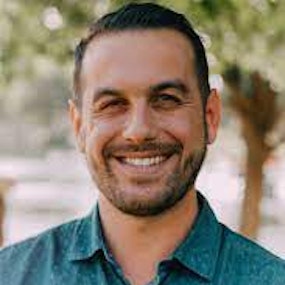
Anthony Moore
Writer, Author, Speaker, Coach
Anthony Moore is a writer, author, coach, and speaker who has been featured in Business Insider, Fast Company, Thought Catalog, CNBC, Yahoo!, Thrive Global, and many more top online publications. He writes about personal growth, self improvement, and writing.


























